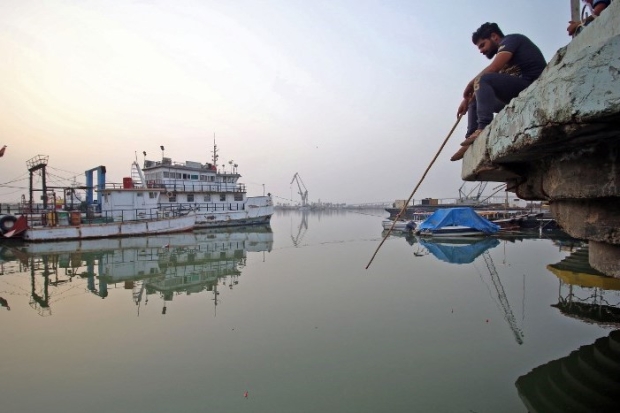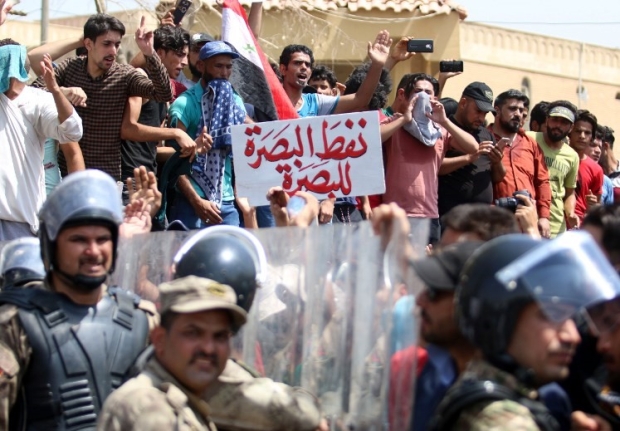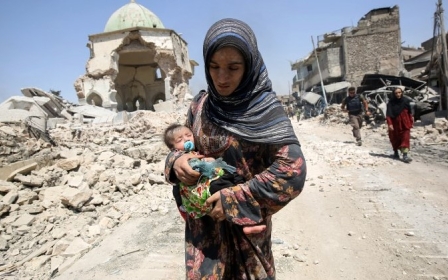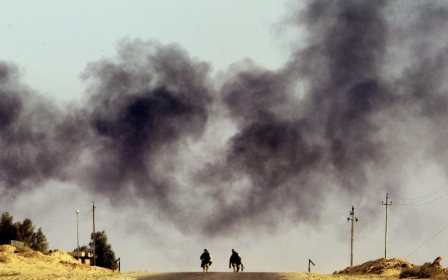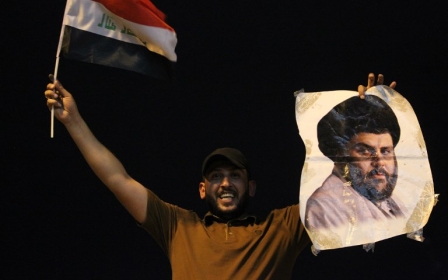What's behind Iraq's Basra protests?
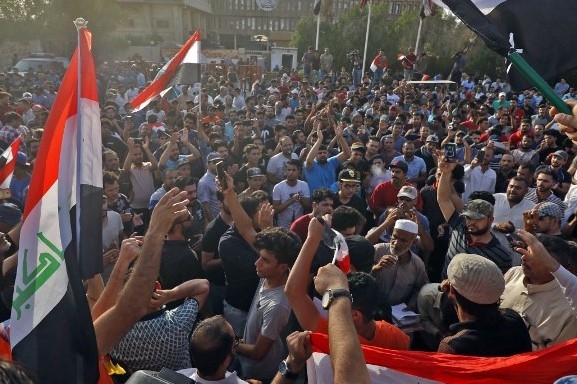
The protests in Basra have been decades in the making and involve a complex set of factors. Over the last week demonstrators have taken to the streets of Basra, Iraq's third largest city, protesting unemployment and lack of services. The protests only intensified when Iraqi security forces killed one of the participants.
How Prime Minister Haider al-Abadi defuses the crisis will serve as a test for him, as he seeks re-election as a compromise candidate, and will only increase public pressure to expedite the process of forming a new government after the May elections.
A Tale of One City
To understand the latest protests one must read Peter Harling's essay "Basra Dystopian City". My mother used to speak of Basra in its glory days in the 1960s as a thriving urban centre with grandiose homes known as shenasil with wooden facades and ornate hanging balconies overlooking the Shatt Al-Arab waterway.
My first trip to Basra as an adult was in 2004 and the city she described did not exist. I saw Harling's dystopia, a city devastated by three wars, an uprising, and a decade of sanctions. How did a city once described as Eden become this way?
Basra served as a frontline metropolis during the Iran-Iraq war, with Iranian offensives - particularly after 1986 - to seize the city, destroying much of its urban fabric.
Basra served as a frontline metropolis during the Iran-Iraq war, with Iranian offensives - particularly after 1986 - to seize the city, destroying much of its urban fabric
After 1991, when Iraqi forces withdrawing from the battlefield in Kuwait poured into Basra, a disgruntled soldier fired a tank round at a portrait of Saddam Hussein that sparked the Intifada, an uprising that spread to 15 out of 18 Iraq's provinces in the south and north. For its rebellious streak, Saddam Hussein deliberately neglected the reconstruction of this city and let it suffer under UN sanctions as a punishment.
Basra was relatively unscathed during the 2003 invasion, but it suffered during the ensuing decade with rival militias fighting over the city, running kidnapping and extortion rackets, and served as a battleground between these militias and the Iraqi and US military in 2008.
Since then the discontent in Basra has been building up. Basra was one of the cities that took part in anti-government protests in the summer of 2015 over corruption in the government, unemployment, and lack of services, particularly salinity in the water, water shortages, and frequent power cuts. Those are the exact same demands articulated over the last week.
Iraqi religious leader Muqtada Sadr rode the 2015 wave of discontent, securing an electoral victory for his coalition, Al-Sairoun (The Marchers) in May. Yet unlike 2015, Iraq does not have a government to deal with these issues.
Iranian pressure
The demonstration was initially sparked by electricity shortages in Basra, after Iran, which provides 1,200 megawatts of electricity to the area, decreased the supply.
The reason might not be failure of the electric grid, but a more subtle side effect of the actions of the Trump administration. Iran's decrease of electricity to Iraq serves as a mean to pressure the Iraqi government over payments for its energy, a process which has become more complicated due to American sanctions against the Islamic Republic.
Al-Abadi arrived in Basra on 13 July to hear the protesters' demands. The following day would have marked the 60th anniversary of "The 14 July Revolution". the Iraqi coup/revolution which took place in 1958, establishing Iraq’s republic.
The month of July is searing hot and it is no surprise that Iraqis took to the street, whether it was in the days before air conditioning in 1958, or when it fails in 2018 due to a lack of electricity.
The situation in Basra is reminiscent of the Niger Delta; both regions abundant in hydrocarbons, yet do not enjoy the largesse of this energy source
The protesters over the last week blocked access to Iraq's oil fields in West Qurna, leading to the evacuation of the foreign staff of Exxon-Mobil, PetroChina and Lukoil, threatening to reduce the state's oil output.
The situation in Basra is reminiscent of the Niger Delta; both regions are abundant in hydrocarbons, yet do not enjoy the largesse of this energy source. Instead they suffer the environmental degradation caused by exploiting oil and gas, including air and water pollution, and rarely are the locals in either area employed in the industry, while the capital city and its political class reap all the benefits.
This paradox, where areas rich in oil often suffer as a result, is referred to as the "resource curse", and it would be fair to say Basra is cursed.
The tribe and the state
In the case of Basra, the civil society actors include leading members of the local tribes. Tribal institutions have used their own mechanisms of honour, reconciliation and reintegration when the Iraqi justice system has failed. Or in some cases tribe and the state became hybrid institutions.
For example, Sheikh Ya’arab al-Mohammadawi is a tribal leader and the chairman of the dispute resolution committee on Basra's provincial council.
The protests in Basra are part of a conflict between the periphery and capital, between the government and oil companies on one hand, and the Basra region, on the other. Dhurgham Al-Maliki, sheikh of the Bani Malik tribe, and Muzahim al-Tamimi, sheikh of the Bani Tamim, two of Basra's largest tribes, have emerged as the representatives of the protesters.
Al-Tamimi published a statement on his Facebook page calling on the prime minister to address the people of Basra directly. Via post-modern means, the leader of a pre-modern entity summed up the issues: 1) oil corporations need to address unemployment, 2) Basra needs infrastructure including a reliable power station and a desalination plant.
Hussam Abulhil, a leader of the Bani Mansour tribe to which the slain 30-year-old protester belonged, demanded his killer face justice and called for the sacking of Basra's security chief. The tribal sheikhs are not only demanding justice, but also seeking to maintain their control of patronage networks among their members. Delivering jobs is one way they cement patronage.
The oil corporations in Basra will have to rethink their corporate social responsibility strategies in order to address the protest demands.
Finally, while al-Abadi fulfilled the protesters' demands to meet with them in person, the task of delivering promises will be more daunting as it is uncertain if he will become prime minister. Until that is resolved, there is no government to implement the protesters' demands.
- Ibrahim al-Marashi is Associate Professor of Middle East History at California State University San Marcos. His publications include Iraq's Armed Forces: An Analytical History (2008), The Modern History of Iraq (2017), and A Concise History of the Middle East (forthcoming).
The views expressed in this article belong to the author and do not necessarily reflect the editorial policy of Middle East Eye.
Photo: Dozens of Iraqis shout slogans and wave national flags during a demonstration outside the local government headquarters in the southern city of Basra on 13 July, 2018 as they protest against poor services, unemployment, and corruption (AFP)
This article is available in French on Middle East Eye French edition.
New MEE newsletter: Jerusalem Dispatch
Sign up to get the latest insights and analysis on Israel-Palestine, alongside Turkey Unpacked and other MEE newsletters
Middle East Eye delivers independent and unrivalled coverage and analysis of the Middle East, North Africa and beyond. To learn more about republishing this content and the associated fees, please fill out this form. More about MEE can be found here.



